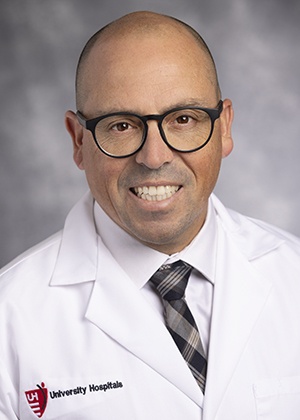
Kidney Stone Treatment & Prevention Services
About one out of every 10 people will experience a kidney stone during their lifetime. If you have a kidney stone, the experienced urology team at University Hospitals can develop a personalized care path for immediate relief and help you prevent new stones from forming.
Our urologists and other kidney stone experts offer non-invasive and minimally invasive treatment options to remove your kidney stone based on its size, location and your other health conditions. Our team is with you every step of the way to ensure your complete comfort and successful recovery.
Find Relief From Kidney Stones
If you think you may have a kidney stone, or have suffered from them in the past, please contact the UH urology team to schedule an appointment at 440-697-6073.
Find out more about:

Kidney Stones: What to Know About This Common Condition
Kidney stones are on the rise due to a mix of suspected risk factors such as obesity, diabetes and even climate change.
What Are Kidney Stones?
Kidney stones are made of dissolved minerals, such as calcium, that crystalize in the kidney. These stones either stay in the kidney or travel down through the ureters, which are tubes that connect your kidneys with your bladder. Sometimes, if the stone is large enough, it gets stuck in the ureter and blocks urine, causing pain. If the stone passes into the bladder, expelling it during urination can also be quite uncomfortable. Other kidney stone symptoms may include:
- Pain in the side or back, which may radiate to the belly or groin
- Blood in the urine
- Cloudy or odorous urine
- Fever and chills
- Frequent urination
- Nausea and vomiting
With the advanced diagnostics needed, our urology experts conduct blood, urine and imaging tests – such as an X-ray, ultrasound or computed tomography (CT) scan – to determine the type of stone you have, its location and its size.
Based on the test results and a full medical evaluation, our specialized team of kidney stone experts will recommend the best kidney stone treatment options for your unique case.

Metabolic Evaluations for Stone Prevention
Removing stones and ensuring your comfort is our most immediate concern. However, the experts at UH conduct a complete metabolic evaluation to find out why your stone formed and how to prevent others from occurring.
A metabolic evaluation includes an analysis of the passed stone, as well as 24-hour urine collection and dietary log. In most cases, by analyzing urine over a 24-hour period and conducting a complete health assessment, our specialists can pinpoint the cause of kidney stone formation.
Not all healthcare organizations perform a metabolic evaluation, but our team is committed to helping you avoid another painful kidney stone experience. Our specialists are highly experienced in performing metabolic evaluations and recommend them for all our patients with kidney stones.
Managing and Treating Kidney Stones
University Hospitals Stone Clinic
The University Hospitals Stone Clinic, located at UH Ahuja Medical Center’s Cutler Center for Men, is a comprehensive program that delivers efficient, coordinated and compassionate care for patients with kidney stones.
Learn more about the UH Stone ClinicMore than 80 percent of kidney stones pass on their own. In these situations, our primary goal is to reduce your kidney stone pain and discomfort and help it pass quickly and without injury.
For more complex or larger stones, there are numerous non-invasive and minimally invasive treatments available. Many of our techniques involve the use of state-of-the-art laser systems to break up larger stones so they can be more easily removed. Laser technology is one of the safest and most efficient sources of energy used to treat kidney stones.
At University Hospitals, our skilled urology team operates the scopes and is responsible for every step of the process. This typically results in the faster and more precise identification of the stone, a more efficient overall procedure and better results.
Procedures used to treat kidney stones include:
- Cystolitholapaxy: This procedure uses a tube with a camera on the end, called a cystoscope, to locate bladder or kidney stones. The surgeon inserts the scope through the urethra and then uses a laser to break the stone up into smaller pieces so that it can be removed. This procedure is performed under local or general anesthesia, and patients generally can go home later the same day.
- Shock waves or extracorporeal shock wave lithotripsy (ESWL): A non-invasive procedure, we use shock waves to break stones into smaller pieces, so they can be passed through the urine.
- Ureteroscopy: This procedure uses a long, thin tube with a light and a camera on the end, called a ureteroscope, inserted through the urethra. The surgeon can precisely locate the stone and remove or break the stone into smaller pieces using laser technology.
The ureteroscope used in the procedure may be rigid or flexible, depending on the size and location of the stone, the patient’s anatomy and other factors. Advancements in technology have made flexible ureteroscopy an option in more cases. Advantages of a flexible scope include better success rates and lower risk of complications. - Percutaneous nephrolithotomy (PCNL): Reserved for larger stones, this procedure to remove kidney stones uses a small incision in the back with a tube inserted to the kidney stone location. The urologist will then insert the tools through the tube to remove the stone.
- Mini percutaneous nephrolithotomy: This procedure uses smaller incisions and instruments than a standard PCNL, eliminating the need for a tube before and after surgery. Benefits of a mini PCNL include less pain and bleeding and fewer risks of complications. Patients can return home the day of surgery and can generally resume normal activities faster.
- Percutaneous nephrolithotripsy: Using the same technique as PCNL, our urologists treat larger kidney stones, usually 2 cm or larger, by inserting tools through a tube inserted in a small incision in the back. In this procedure, the stone is broken into small fragments before being removed through the tube.
Meet our Team
Jose Salvado, MD
- Urology
-
Beachwood (7 mi.)
Lyndhurst (7 mi.)
Felipe Pauchard Theoduloz, MD
- Urology
-
Parma (11 mi.)
Parma (13 mi.)
Find Complete Relief from Your Kidney Stones
If you think you may have a kidney stone, or have suffered from them in the past, please contact the UH urology team to schedule an appointment at 216-844-3009.




